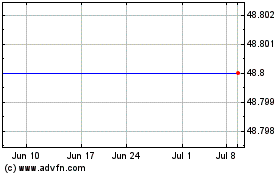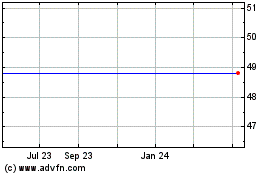Exelon Moves to Close Two Illinois Nuclear Plants -- Update
June 02 2016 - 5:16PM
Dow Jones News
By Rebecca Smith
Exelon Corp. said Thursday that it will retire two money-losing
nuclear plants in Illinois after state lawmakers declined to pass
legislation that would have helped keep them running.
The company, which owns utilities serving Chicago, Philadelphia
and Baltimore as well as many power plants, said it will shut down
its Clinton plant in Clinton, Ill., in mid-2017 and Quad Cities
plant in Cordova, Ill., in mid-2018. The plants lost $800 million
in the past seven years.
The announcement underscores the impact that low wholesale
electricity prices are having on owners of older power plants --
especially nuclear facilities, many of which are threatened with
closure.
Prices for wholesale electricity recently hit a 15-year low and
experts expect them to rise too slowly to help generators much.
Fifteen to 20 nuclear reactors are considered at risk of premature
closure in the next five to 10 years, according to the Nuclear
Energy Institute, a trade group.
Fitch Ratings said the Exelon decision "may precipitate other
nuclear plant closures" for Exelon plants, possibly including the
Byron, Ginna, Nine Mile Point and Three Mile Island plants in
Illinois, New York and Pennsylvania.
Other utilities, including Entergy Corp. and Dominion Resources
Inc., already have announced nuclear closures for financial
reasons.
The Illinois legislature adjourned Tuesday without acting on
legislation that would have rewarded nuclear plants and other
carbon-free generators that help the state meet its environmental
goals. The bill included other provisions that would have imposed
new charges on energy consumers.
Experts said there is still a slim possibility the legislation
could move forward in a special session but the utility said it
wasn't bluffing.
"To be clear, we have made the decision to shut the plants
down," Exelon said.
Exelon became the biggest owner of nuclear plants in the U.S. in
the 1990s, riding a wave of industry consolidation, and within
years had turned problem-prone units into smooth running, highly
profitable plants. The good times lasted about a decade. But the
gas fracking boom and other changes in electricity markets after
2009 sent electricity prices tumbling.
While the industry has tried to garner compensation that
recognizes nuclear reactors' special attributes such as their lack
of air pollution, those efforts have largely been unsuccessful.
The Nuclear Energy Institute said Thursday that the pending
retirements marked an "alarming trend" and will make it harder for
states to meet carbon reduction goals set by the Environmental
Protection Agency.
A study by the state of Illinois found that the two plants'
closures would raise wholesale energy costs by $439 million to $645
million annually, depending on the price of natural gas and other
factors. Gas generation is generally considered to be the most
likely replacement.
The Union of Concerned Scientists, an environmental group, said
its own analysis found that by spending more on energy efficiency
and reviving a stalled renewable energy mandate, Illinois could
replace the plants' 2,500 megawatts without fouling the air or
jacking up utility bills.
Even so, Steve Clemmer, the group's director of energy research
and analysis, said "We do see value in nuclear power helping to
address climate change."
Write to Rebecca Smith at rebecca.smith@wsj.com
(END) Dow Jones Newswires
June 02, 2016 17:01 ET (21:01 GMT)
Copyright (c) 2016 Dow Jones & Company, Inc.
Exelon (NYSE:EXC)
Historical Stock Chart
From Mar 2024 to Apr 2024

Exelon (NYSE:EXC)
Historical Stock Chart
From Apr 2023 to Apr 2024
